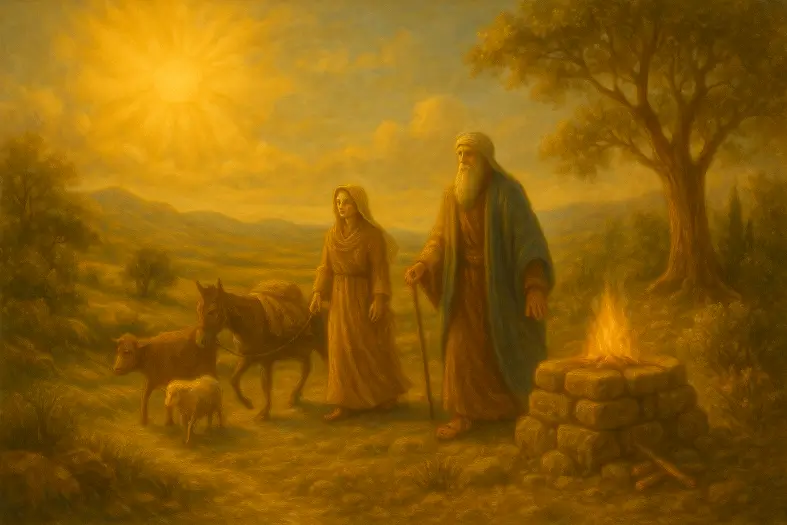לֶךְ־לְךָ – Lech-Lecha

Lech Lecha begins the covenantal journey — where faith turns into destiny. Avram leaves homeland and kin at G-d’s command, walking toward an unknown land with unwavering trust. Famine drives him to Egypt, where Sarah’s protection reveals Divine guardianship. Returning to Canaan, Avram parts peacefully from Lot and later rescues him from captivity, embodying moral courage amid power and peril. G-d then seals the Brit bein HaBetarim, foretelling exile and redemption. Childless, Avram fathers Yishmael through Hagar, yet G-d promises a greater future through Sarah. Their new names — Avraham and Sarah — mark rebirth through covenant, sealed in Brit Milah, the eternal sign of faith.
Haftarah: Isaiah 40:27–41:16
בְּרֵאשִׁית – B'reishit – Genesis
3
Hashem spoke to Avram saying, “Lech lecha mei’artzecha, u’mi’moladetecha, u’mi’beit avicha” — “Go forth from your land, your birthplace, and your father’s house to the land that I will show you.” With complete emunah (faith) and bitachon (trust), Avram departed from Charan, taking with him Sarai Imeinu and his nephew Lot, following the Divine call toward an unknown future. Hashem promised to make Avram into a great nation, to bless those who bless him, and to bestow through him blessing upon all the families of the earth.
Upon entering Eretz Canaan, Avram built a mizbeach (altar) and called upon the Name of Hashem. Soon, however, a famine struck the land, and Avram journeyed to Mitzrayim (Egypt). Fearing for his life because of Sarai’s beauty, he asked her to say she was his sister, lest the Egyptians kill him to take her. Pharaoh’s courtiers praised her to their king, and Sarai was brought to Pharaoh’s palace. Hashem afflicted Pharaoh and his household with plagues, protecting Sarai’s honor. Pharaoh returned Sarai to Avram with apologies and sent them away laden with wealth, servants, and cattle.
Back in the Land, Avram and Lot prospered greatly, until conflict arose between their shepherds. In humility and peace, Avram said to Lot, “Let there be no strife between us, for we are brothers.” Lot chose to dwell in the lush but wicked plains of Sodom, while Avram remained in Chevron, near the holy city of Hevron, where he again built an altar to Hashem. There, Hashem renewed His promise that Avram’s descendants would inherit the land, numerous as the dust of the earth.
In time, the region was shaken by war — four mighty kings against five rebellious city-states. The invading coalition triumphed, seizing the people and possessions of Sodom, including Lot. When Avram heard that his nephew had been taken captive, he gathered a small band of loyal men, pursued the kings by night, and miraculously defeated them, liberating Lot and restoring the captives. Upon his return, Malki-Tzedek, king of Shalem (Jerusalem) and priest of the Most High, came forth to bless him: “Blessed be Avram to El Elyon, Maker of heaven and earth.” Avram refused any reward from the king of Sodom, declaring that his wealth and victory came solely from Hashem.
After these events, Hashem appeared to Avram in a vision, saying, “Al tira Avram, anochi magen lach” — “Do not fear, Avram, I am your shield.” Avram spoke of his longing for a child, asking how the covenant could continue without an heir. Hashem brought him outside and said, “Look toward the heavens and count the stars — so shall your offspring be.” Avram believed, and it was accounted to him as tzedakah (righteousness). Hashem then entered into the Brit bein HaBetarim (Covenant Between the Parts), revealing that Avram’s descendants would endure exile and oppression for four hundred years but would emerge with great wealth to inherit the Promised Land.
Years passed, and Sarai remained barren. Out of devotion to her husband’s mission, she offered her maidservant Hagar to Avram as a wife. Hagar conceived and, feeling elevated, mistreated Sarai. Sarai responded firmly, and Hagar fled into the wilderness. There, a malach (angel) of Hashem appeared to her, commanding her to return and promising that her son Yishmael would father a mighty nation. Hagar returned and gave birth to Yishmael, the first child of Avram.
When Avram reached ninety-nine years of age, Hashem appeared again and expanded the covenant. Avram’s name was changed to Avraham, signifying “Av hamon goyim” — “father of multitudes,” while Sarai became Sarah, “princess to all humanity.” Hashem commanded the eternal sign of the covenant — Brit Milah, circumcision — to be performed on every male descendant on the eighth day. Avraham immediately fulfilled the command, circumcising himself, Yishmael, and all the males of his household.
Thus was sealed the everlasting bond between Avraham, Sarah, and their descendants — a covenant of emunah, moral purpose, and holiness that would shape all generations to come.




